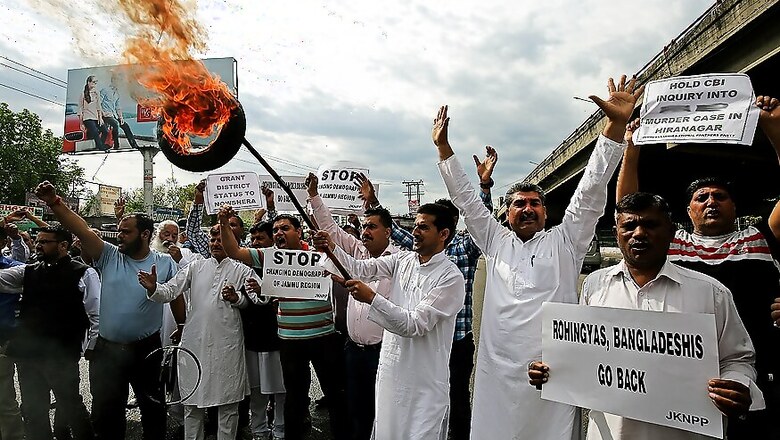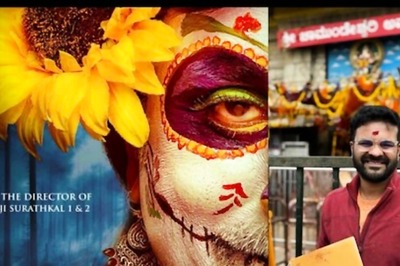
views
Jammu: The region is sitting on a powder keg after the arrest of eight individuals accused in the gangrape and murder of an eight-year-old girl in Kathua district.
Tensions, though, were high even prior to the gruesome incident as many Bharatiya Janata Party (BJP) cadres whipped up fears that the overwhelmingly Muslim communities of Gujjar-Bakarwal and Rohingya refugees may lead to “a demographic change”.
To strengthen this narrative, the word being spread is that the People’s Democratic Party (PDP) runs a ‘pro-Kashmir’ government. At the heart of this discontent — the Jammu Bar Association.
On April 9, a group of lawyers from the association prevented J&K crime branch officers from filing chargesheet against the Kathua accused. Such was the ruckus at the Jammu High Court that a police contingent, facing rancorous protests, failed to make way for the crime branch team to enter the court complex.
Two days later, on April 11, the association organised a city-wide shutdown to protest against the “targeting of minority Dogras” in the case. The lawyers blocked roads and burnt tires. The president of Jammu Bar Association BS Salathia even went on to say, “The youth of Jammu, who are carrying the Tricolour today, can pick up AK-47s and bombs if the state does not listen to their demands.”
However, on April 14, the same association had a sudden change of heart when they took out a candlelight march in memory of the girl. That day, Salathia urged the state government to provide adequate monetary compensation to the family of the victim in order to provide immediate relief. The press release, which talked about the Bar’s candlelight march, was interestingly sent to the media just hours after BJP ministers Chander Prakash Ganga and Lal Singh, who had earlier taken part in the rally in support of Kathua gangrape accused, submitted their resignation.
These events, all in the name of asking for a CBI probe in the incident, reflect a wider problem — a simmering discontent with the minorities in Jammu, the roots of which go back to the 2008 Amarnath Land Row.
A dispute over the transfer of 800 kanals of land to the Amarnath Shrine Board in June that year created a split between the Muslim-majority Kashmir valley and the Hindu-dominated region around Jammu city.
This was the time that people like today’s J&K deputy chief minister Nirmal Kumar Singh, Minister of State Jitendra Singh, Vishwa Hindu Parishad state president Leela Karan Sharma and others were catapulted to prominence. Salathia, was also among the many who were at the centre of the row.
Since then, the region's politics has changed drastically. 2008 proved to be a turning point for Jammu as identity politics and mistrust for Kashmir found a larger acceptance.
Pawan Singh, a low rung Rashtriya Swayamsevak Sangh (RSS) member, who has been part of the outfit since 2007, agrees.
“Those protests brought a sense of enlightenment among the people of Jammu. The people of Kashmir always took decisions that impacted us. For once, we got a chance to take our fate in our hands and we didn’t let the opportunity go begging,” he said.
The Amarnath Land Transfer protests proved to be a huge success for BJP, which before that had a minimal presence in Jammu. When the state Legislative Assembly elections were held in December 2008, the national party won 11 seats in Jammu – a phenomenal jump from the single seat they could score prior to that. BJP’s seat share again grew manifold in 2015 state elections, when the party won 25 seats in Jammu.
“It was us (the RSS) that made sure BJP wins in Jammu. They are our own people, unlike the Pakistani stooges in Kashmir. They talk about issues that matter to the Hindus. They won’t tolerate when Hindus are falsely accused,” Singh said.
The statement was pretty similar to what the lawyers at Jammu Bar Association have been saying.
On April 15, 2018, Salathia addressed a group of people within the premises of the Jammu and Kashmir High Court and claimed that “Delhi sided with Kashmir”. The crowd — full of lawyers, activists, academicians and commoners — booed in unison and shouted “Shame, Shame”.
After the event was over, a female lawyer, who was part of the gathering, said, “The Kashmiri police has targeted innocent Hindus in this probe. They have taken the side of their community.”
The above statement, among other allegations voiced by lawyers present in the event, can be seen finding acceptance among many in Jammu. Social media is being used to spread messages about the “unfair targeting” of Hindus.
One such message, which is vociferously shared on WhatsApp groups reads: “Yeh log to apni behen ke saath shaadi karte hai, toh yeh ginhoni harkat bhi woh hi log kar sakte hai. (These guys marry their own sisters, so only they could have carried out this horrendous crime.)”
Today, the Kathua case has not only become a platform to make outlandish claims but also a rallying point through which communal tensions are being stoked.
During Salathia’s speech at the April 15 event, Ajay Charangoo of Panun Kashmir, an advocacy group for displaced Kashmiri Pandits, said, “This is an assault on Hindus. We are being told that people who ruled us for centuries are not guilty but it is we who are guilty. We are being told that Hindus are rapists.”
Charangoo further went on to blame the separatist leadership of Kashmir. “The police are working on the directions of the government, which, in turn, is working on the directions of Syed Ali Shah Geelani,” he said.
Yogesh Kapoor, youth state working president of the Nationalist Congress Party (NCP), believes that the Kathua case has again brought Jammu to a point where “anything can happen”.
“Look at the statements being made, especially by BJP leaders and Bar Association. The situation on the ground also isn’t looking good. False news is being spread about the case. Suddenly, this has become a Hindu versus Muslim issue. I fear this might turn into something bad,” he said.
Kapoor’s fears somewhat turned true on Aril 15 when two slaughtered calves were found on a highway in Jammu. One of the calves was shot twice while the other’s throat had been slashed.
Soon after the news spread, minor clashes were reported in Samba district. Authorities promptly suspended mobile internet service in both districts of Jammu and Samba.
A senior journalist and a resident of Jammu, wishing anonymity, corroborates Kapoor’s views. “The situation is much more serious than it was in 2008 during the Amarnath land row.”
He believes the tension, that is palpable on the roads of Jammu today, was further fermented afresh a couple of months ago after the authorities launched what they claimed was an anti-encroachment drive in Jammu and its peripheries, inhabited mainly by Muslim Gujjar-Bakarwal. The nomad tribe, however, resisted the drive terming it “selective” and “part of an orchestrated campaign planned to uproot them from the lands they have been inhabiting for decades”.
The other issue, which widened the gulf between the two communities, is the presence of Rohingya Muslims in Jammu. Various Hindu groups, including BJP, see Rohingya as a “major security threat” and their presence part of a “design” to change the Hindu majority demography of the region.
“The presence of Rohingya is yet another issue that is being used to stoke communal tensions in Jammu. Most of the people from Jammu see the refugees as possible terrorist sympathisers,” the journalist said.
His observation is based on facts. Jammu has already seen a hate campaign against the Rohingya.
In February this year, when the Sunjuwan Military Station in Jammu was attacked by militants, BJP leader and Speaker of J&K Assembly Kavinder Gupta was quick to blame the Rohingya for it. “The incident took place due to the presence of Rohingya in the area,” Gupta had said. The attack resulted in the death of 5 army men, 1 civilians and 3 militants.
The hate tirade further took an ugly turn when a paid advertisement campaign was being spearheaded by some groups and activists against the Rohingya through some local newspapers. “Rohingyas: a ticking time bomb. Evict them to save Jammu”, one advertisement read. Leaders of organisations like Chamber of Commerce and Industry and National Panthers Party issued some of these advertisements.
Salathia, the Jammu Bar Association President, endorses the same view. “If the government does not throw Rohingya Muslims out of Jammu, we will make Jammu Rohingya free,” Salathia said.
Yet, there are many who don’t share such views on Rohingya, the Gujjar-Bakarwal or the Kathua gangrape and murder accused. Many believe that the Jammu Bar was used by the BJP-RSS to further its political agenda and then left to its own when national outrage changed the discourse.
“They (Bar Association) have made it into a Hindu-Muslim issue when it should be about justice forthe girl,” Vishal Mahajan, a lawyer, who isn’t part of the Jammu Bar Association, said.
Issues like Rohingya settlers in Jammu, mistrust of the “pro-Kashmir” government and “neglect for Jammu”, among many others have now found themselves intertwined with the case in Kathua.
Surender Raj, an activist who has organised several protests since January demanding justice in the Kathua case, says that the crime itself was a by-product of the same hate and mistrust that has been spread all these years in Jammu.
“Now, Jammu is not what it used to be. The seeds of disharmony have already been sown. Things may get worse in coming months,” Raj said.













Comments
0 comment